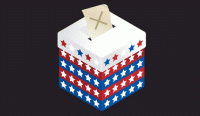Civic Engagement Tactics 2.0
What if the ’60’s had social media?
Start with Courage
In 1969, RAND political analyst Daniel Ellsberg risked espionage charges by photocopying secret Pentagon Papers that documented how U.S. presidents lied to the American public about military escalation plans in Vietnam and lied about its chances of success. In the documentary The Most Dangerous Man in America, a reporter interviews Ellsberg after the famous whistleblower gave himself up to the authorities for leaking boxes of information to media:
This climax is stirring, the retort simple. But in the documentary's final minutes, Ellsberg admits being frustrated that his efforts did not galvanize more citizens to stop a war that its leaders knew was unwinnable. Why didn't Americans rein in a President who promised de-escalation, but wanted to turn Northern Vietnam into nuclear ash? Listen to Nixon on audio tape.
What if the 1960's Had Social Media?
Ellsberg didn't have Facebook. In 1969, he didn't have instant networking and mobilization technologies to coordinate flash mobs. The pentagon papers were actually delivered to the New York Times in the back of his car.
Today, Change.org lets you click once to start a petition, click again and mobilize support, and click a third time to confirm later that your movement has ended South Africa's sanctioning of "corrective" rape or stopped Florida from trying a 12-year-old as an adult. You don't need to be an expert in leadership strategies or spend hours addressing envelopes. Meetup.org will handle the community building. Just bring your good ideas and "change something."
What if the 1960's Had Datascapes?
Commanding facts to inform and support your cause is equally convenient in the Internet era. Remember card catalogues? Today, Wolfram Alpha takes seconds to report that 12% of our country lives below the poverty line. Hijacking media can be used to score political points (see Obama Likes Spending or Palin's Breath). Meanwhile, infographics create rhetorically powerful datascapes on subjects like megachurches and Muslims in America (see Good) -- a sophisticated iteration of USAToday's Snapshot.
Humor
Revolution and wit have been partners for generations. When not doing time in the Bastille or moving to different countries to escape prosecution, Voltaire used humor strategically and tactically to wound the state, a practice wielded by the theatrical Yippies in the mid-1960's and that continues in the new millennium.
Early this century, the famous email exchange between Jonah H. Peretti and Nike transpired when the sportswear company refused to fulfill an order for a pair of shoes customized with the word "sweatshop." During the correspondence with Nike, Peretti writes, "I choose the iD because I wanted to remember the toil and labor of the children that made my shoes. Could you please ship them to me immediately?" Within days, the correspondence had detonated dirty rhetorical bombs around the world and Nike improved oversight over its manufacturers. Nothing can clean up radiating ridicule.
Outrage wrapped in funny helps keep Occupy Wall Street in the news. See Smosh.com's collection of 20 funny OWS signs. Likewise, the CodePink anti-war group engages in serious/funny (and pink!) dissent.
By veiling their attacks with unblinking absurdity, contemporary reformers neutralize the opposition's practice of labeling whistleblowers as grumpy radicals with stinky feet, the ones nobody sits by during potlucks.
Frame the Debate
According to cognitive linguistics professor George Lakoff of UC Berkeley, "The first rule of effective communication is stating the positive in your own terms, not quoting the other side's language with a negation." Even better, he says, is presenting your language in a simple moral framework. George Bush framed taxes as an illness by calling for "tax relief," explains Lakoff in Don't Think of an Elephant: Know Your Values and Frame the Debate. "For there to be relief there must be an affliction, an afflicted party, and a reliever who removes the affliction and is therefore a hero. And if people try to stop the hero, those people are villains for trying to prevent relief."
Kids are disempowered by definition, not yet high school graduates, not yet writers, not yet politicians, not-yet captains of industry, and not yet powerful enough to support social justice. However, today's adolescents have mastered tools necessary for connecting and publishing, two critical components for influencing society in ways unimaginable to generations that are celebrated with HBO miniseries and their own Beatles soundtrack.
